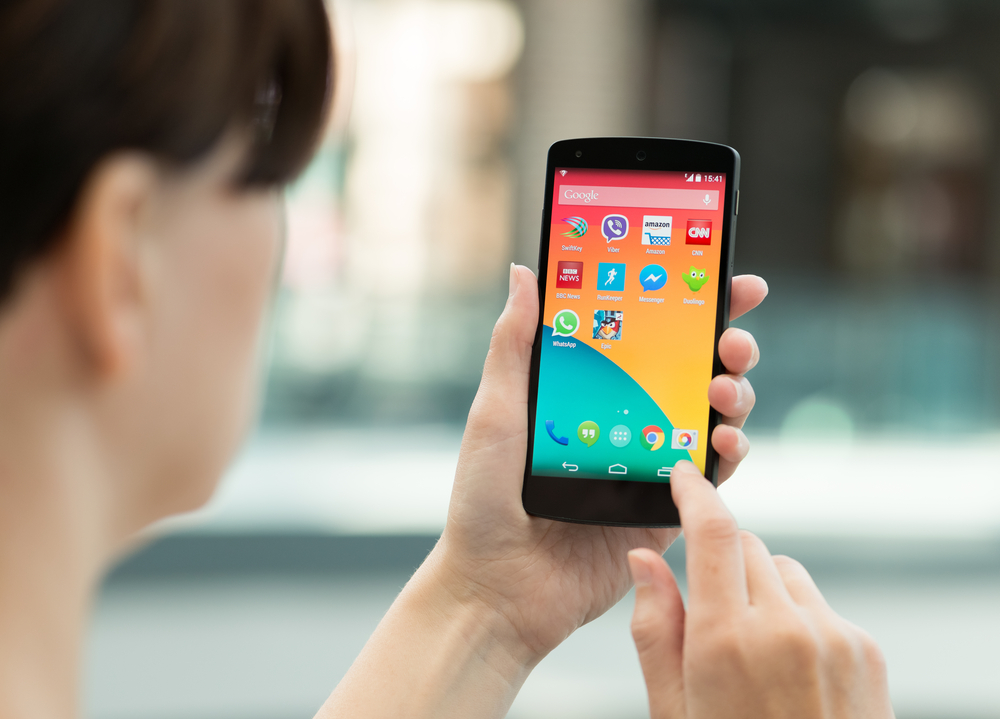If You Use an Android, Google Has an Urgent New Warning for You

One of the unfortunate realities of technology is that just as it makes our lives more efficient and convenient, it can also make us more vulnerable as we become more reliant on it. The seemingly never-ending cybersecurity threats targeted at smartphones are just one example of this problem, thanks in part to how much we rely on them to do everything from online banking to making important purchases. And if you’re one of the millions of people who use an Android phone, you may want to be aware of the latest warning that was just issued. Read on to see what security concern is currently threatening the popular devices.
READ THIS NEXT: If You Have an Android, You’ll Be Barred From Doing This, Starting in August.
Android devices have recently been subject to a string of security threats.

Even though it may seem like Apple has the market cornered on mobile devices, the reality is that Android makes up a much more sizable portion than many might realize. The Google-made products make up 70 percent of the worldwide market share compared to 25 percent for Apple’s iOS as of Jan. 2022, according to Statista. Unfortunately, this popularity makes them an attractive target for cybercriminals looking to take advantage of certain security lapses or push nefarious software.
Recently, financial cybersecurity firm ThreatFabric announced in a blog post that it had discovered a new version of an infamous piece of Android-targeting malware known as “Octo.” The company warned that once users accidentally download the program, it can essentially take over the device and use it to commit fraud and mine sensitive information while secretly running in the background. And on March 25, Google announced that it had banned dozens of apps from its Google Play marketplace after a private investigation discovered that a company involved in their development had designed them to secretly collect and transmit data on users who had downloaded them, The Wall Street Journal reported.
Now, experts are warning about three apps after discovering they contained malware.

Unfortunately, the security threats to Android users haven’t stopped coming. In a post on May 6, cybersecurity firm Kaspersky announced it had discovered three apps in the Google Play store that contain Trojan-style hacker software known as “Jocker.” While Google has previously banned any apps containing the code, the firm warns that the program can get by security measures set up by the tech giant to catch malware, The Sun reports.
According to Kaspersky’s investigation, the three nefarious apps they discovered are called Blood Pressure App, Camera PDF Scanner, and Style Message. However, scammers have also previously copied other popular apps and brands to lure in victims, with dupe apps of games such as Minecraft, GTA5, Vidmate, and GameBeyond all having been found to house the software.
RELATED: For more up-to-date information, sign up for our daily newsletter.
The malware can end up literally costing you in the long run.

Kaspersky explains that the malware can pose a potential financial threat once it finds its way onto a device, which scammers often achieve by downloading well-known apps, adding the malicious code, and posting the doctored version back up on the Google Play store. Then the program will request access to read text messages, which it uses to steal confirmation codes and secretly sign the victim up for costly subscriptions through other apps, The Sun reports.
“Most of the apps completely lack any legitimate functionality,” the cybersecurity firm explains. “They begin subscribing straight after they’re launched, while the user sees a loading window.”
From there, users may not even notice the charges as they come in over time. “They usually pay for legitimate services in a user’s name and scammers take a cut from the money billed. These types of subscription fees tend to be fleeced from the phone balance,” the firm writes.
Here’s how to avoid falling victim to the latest malware attacks.

Fortunately, there are some relatively simple ways to avoid falling victim to the latest cybersecurity threat. Even though Kaspersky recommends only downloading apps from a trusted source, it’s still important to exercise caution when using official marketplaces such as Google Play. “Read the reviews, read up on the developer, [and] the terms of use and payment,” they suggest.
It’s also essential to control how you engage with programs after downloading them. “Even if you trust an app, you should avoid granting it too many permissions,” the cybersecurity firm cautions. “Only allow access to notifications for apps that need it to perform their intended purposes—for example, to transfer notifications to wearable devices. Apps for something like themed wallpapers or photo editing don’t need access to your notifications.”
READ THIS NEXT: Microsoft Just Issued This Urgent Warning for All Windows Users.